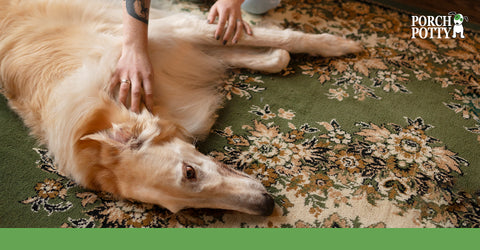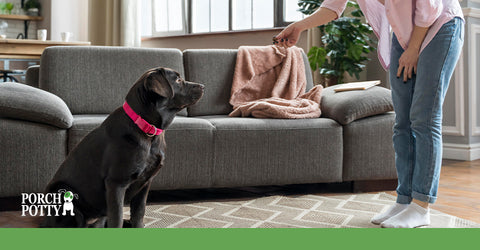
A golden retriever dog with toilet paper over his shoulder lays down on a white floor as his owner's hand scolds him.
Are you struggling with potty training an older dog? It can be challenging, but with the proper techniques and patience, you can successfully train your furry friend and keep your carpets urine-odor-free. The first step is establishing a routine and taking your dog outside frequently, especially after meals, naps, and playtime. This will help your dog associate going out with potty time. Reward your dog with treats and praise when they go potty outside to reinforce positive behavior.
It is essential to keep a close eye on your dog and supervise them indoors to prevent accidents. Consider using a crate or confinement area when you cannot manage them. This will also help them develop bladder control and reduce the likelihood of accidents.
If accidents occur, clean them up immediately with an enzymatic cleaner designed to eliminate urine odors. Avoid harsh chemicals or ammonia-based cleaners, which may encourage your dog to continue marking the same spot.
Consistency is vital when potty training an older dog. Stick to your routine and be patient. It may take some time for your dog to adjust and learn the new behavior, but with perseverance, you'll soon have a fully potty-trained dog and clean carpets.

A large white dog with copper and black patches is laying on the ground outside. Its paw is in its owner's hand, who has black nail polish and blue jeans.
How long does it take to potty train an older dog?
Potty training an older dog can be more challenging than training a young puppy, but it is not impossible. Here are some practical tips for potty training an older dog:
Establish a Routine
Older dogs need a consistent routine to learn when and where to go potty. Take your dog outside to go potty at the same time every day. Ensure you take your dog outside first thing in the morning, after meals, and before bedtime.
Use Positive Reinforcement
Positive reinforcement training is the best way to potty train an older dog. Use treats, praise, and other rewards to encourage good behavior. Never punish or scold your dog for having accidents, as this can cause anxiety and stress.
Positive reinforcement dog training is a scientific approach to modifying behavior by rewarding desired behaviors with treats or praise. It emphasizes the importance of timing, consistency, and motivation in positive reinforcement training. It highlights the benefits of this method, including improved communication, increased obedience, and a stronger bond between the dog and owner.
Keep a Close Eye on Your Dog
Keep your dog in a small, enclosed area or use a crate when you are not home to watch your dog. This will prevent accidents from occurring and help your dog understand that the house is not the place to go potty.
Indoor Potty Solutions
Indoor potty solutions, such as pee pads or litter boxes, can be helpful for older dogs who have difficulty getting outside due to mobility issues. Place the pee pads or litter boxes in a designated area of the house and encourage your dog to use them.
Be Patient
Potty training an older dog may take longer than training a younger dog. Owners must be patient and consistent in their training efforts, which can be time-consuming.

A golden Afghan hound is laying on its side on an ornate green carpet while its owner gently pets it.
Common Health Concerns for Older Dogs During Potty Training
Older dogs may have bladder control problems or suffer from urinary tract infections or other conditions that make it difficult to control their bathroom needs.
If you suspect your dog has a health condition affecting its ability to control its bathroom needs, consult a veterinarian. The vet can advise you on managing the situation and suggest treatments that may help.
For dogs with bladder control problems, using dog diapers can be helpful. Diapers can prevent accidents from occurring and make it easier for you to clean up any messes.
Monitor their water intake if your dog suffers from a urinary tract infection. Drinking more water can help flush out the condition but can also lead to more accidents. Talk to your veterinarian for advice on how much water your dog should drink.
Common health concerns for senior dogs may include cancer, heart disease, kidney disease, urinary tract disease, liver disease, diabetes, obesity, arthritis, canine cognitive dysfunction (CCD), vision & hearing loss, and dental issues.

A black Labrador retriever with a red collar sits on a gray and white patterned area rug in front of a dark gray sofa. Its owner, who is wearing a pink sweater, blue jeans, and gray ankle socks, offers it a treat.
Behavioral Issues in Older Dogs During Potty Training
Older dogs may exhibit behavioral issues during potty training, such as refusing to go outside, marking, or having accidents in the house. If your dog refuses to go outside, try to make the outdoor environment more appealing. You can do this by providing toys, treats, and positive reinforcement. If your dog is marking, getting them spayed or neutered is essential to reduce the urge to scratch. If your dog has accidents in the house, cleaning up the mess thoroughly is necessary to eliminate any odor. This will help prevent your dog from marking the same spot again.
Here are some detailed tips on how behavioral concerns can be addressed during potty training your older dogs:
- If your dog is marking territory inside the house, clean up any messes immediately to prevent the scent from lingering. Use a pet-specific odor remover to eliminate any odor that may encourage your dog to continue marking.
- Use positive reinforcement training to encourage good behavior. Reward your dog for potty in the designated area and ignore any accidents.
- If your dog has accidents inside the house, consider crate training, where you can place potty pads or a Porch Potty, which is similar. Crate training can help prevent accidents by limiting your dog's access to the house when you cannot supervise them. Make sure to choose an appropriate size crate for your dog and gradually introduce them to it so that they see it as a comfortable and safe space.
- Establishing a routine can be helpful for older dogs who may struggle with changes in their environment or performance. Try to take your dog out to go potty at the same time each day and use consistent commands to encourage them to go in the designated area.
What Can Be Done To Manage Anxiety and Stress During Potty Training
Anxiety and stress can affect an older dog's potty training. This can be caused by changes in their environment or routine, separation anxiety, or other behavioral issues. Providing your dog with a safe and comfortable environment is essential to manage anxiety and stress. You can achieve this by providing a cozy bed, toys, and plenty of affection. You can also try calming supplements or pheromone sprays to help soothe your dog's anxiety.
Ways to manage anxiety and stress during potty training:
- Dogs can pick up on their owner's emotions. If you feel stressed or frustrated, your dog may also become anxious. Stay calm and patient during potty training to help your dog feel more relaxed.
- Older dogs may benefit from having a designated safe space to retreat if they feel overwhelmed or anxious. This could be a crate, a quiet room, or a cozy bed.
- There are a variety of calming aids available that can help reduce anxiety in dogs, such as pheromone sprays, herbal remedies, or medication prescribed by a veterinarian. Talk to your vet about what options may be appropriate for your dog.
Physical Limitations and Potty Training an Older Dog
Older dogs may have physical limitations that make potty training difficult. These limitations can include arthritis, hip dysplasia, or other mobility issues. If your dog has difficulty walking or standing, you may need to provide them with a ramp or lift to help them get outside.
Additionally, you may need to adjust their potty training routine to accommodate their limitations. For example, you can place pee pads, litter boxes, or a Porch Potty in easily accessible areas of your home.

A young woman in a pink button up shirt, blue jeans, and light blue rubber gloves kneels on the floor and leans on a short round table that has a variety of four different cleaning bottles on it. Her Yorkshire terrier is standing in front of her on dark blue carpet.
Getting Rid of Dog Urine Odor and Preventing Future Accidents
Getting rid of dog urine odor is essential in preventing future accidents. Start by blotting up as much urine as possible with paper towels to eliminate the odor. Then, use an enzymatic cleaner designed for pet urine to clean the affected area thoroughly. Be sure to follow the instructions on the cleaner and allow it to dry completely. To prevent future accidents, take your dog outside frequently, especially after eating or drinking. Additionally, keep a close eye on your dog and be aware of any behavioral changes that may indicate they need to go outside.
It may seem daunting when initially potty training an older dog, but it can be accomplished. The key is to maintain a consistent approach to training, have patience with your dog, and consider any physical or behavioral limitations they may have.
By doing so, you can succeed in potty training your furry friend and prevent any unpleasant urine odors on your carpets. It's essential to create a safe and comfortable environment for your dog and don't hesitate to seek assistance from a veterinarian if necessary.
For more information on potty training and older dogs, check out these articles:



